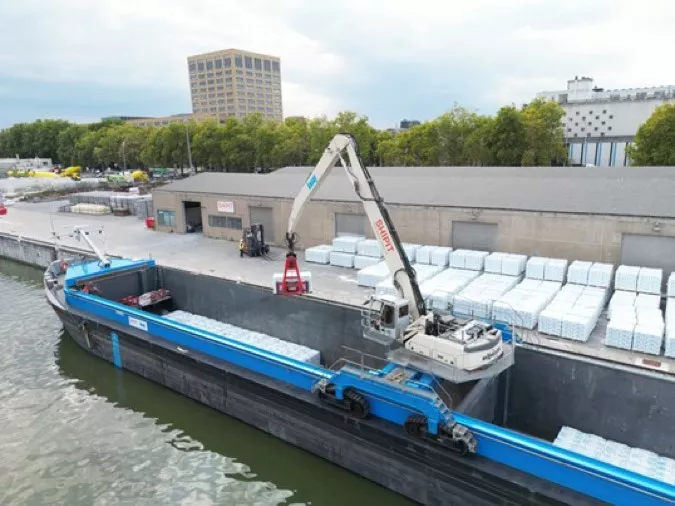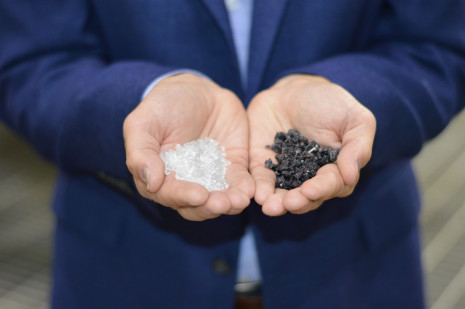Every day, the impact of trucks on our roads is evident, contributing to traffic congestion. At the same time, our waterways offer vast untapped potential. I take pride in the fact that everyone at Shipit shares the same mindset - a commitment to engaging in responsible and sustainable logistics.”
© Shipit

Shipit’s modal shift: moving Goods in a Viable City
Bio
- Mark Goossenaerts
- Business Unit Director at Shipit
- 60 years of age
- Resides in Kalmthout, near Antwerp
- Passionate about sailing, long-distance running, and climate improvement
- Motto: “Get things done, avoid drama, trust each other, and laugh together”
- Mark joined Shipit seven years ago following a career in senior management of 16 years, both nationally and internationally, and after successfully establishing a last-mile project within bpost, Belgium’s national postal service company. His mission at Shipit was to install a last-mile network for construction materials in Brussels.
Hello Mark, why was there a need for a last-mile network?
“Do you know how many trucks drive through our cities? Far too many. And what’s even worse is that the construction sector’s supply chain, responsible for 25% of trucks in the city, is inefficient. Trucks that are nearly empty deliver just a few pallets, often not at the right moment, leading to many costs and mobility issues in our cities.”
What exactly does Shipit do in Brussels?
“First of all, we transport palletised construction materials by inland vessels from our suppliers in Antwerp and other places to our terminals in Brussels. Subsequently, crane trucks efficiently deliver these materials on a just-in-time basis right to the construction sites. This approach, allowing contractors to order materials as needed, represents ‘smart construction logistics’.”

What is the impact?
“A single vessel can transport materials equivalent to the carrying capacity of 200 trucks. Last year alone, our Bulk division transported almost two million tonnes, which would have necessitated 100,000 trucks if Shipit hadn’t been part of the equation. Our pallet division, active in Brussels, is a relatively new business with a mission to make the supply chain to construction sites in cities more efficient. ‘Moving Goods in a Viable City’ says it all: supplying construction sites can and should be approached differently. We’re steadily growing as more customers become acquainted with our services.”
Do you have plans to expand to other cities?
“Absolutely. Our headquarters are located in Antwerp, which like any large city faces major mobility challenges. So that city has to be number one on our list, and the first exploratory discussions have started. We’re developing a plug-and-play concept that we can seamlessly implement in nearly any city, including large ones. Every day, the impact of trucks on our roads is evident, contributing to traffic congestion. At the same time, our waterways offer vast untapped potential. I take pride in the fact that everyone at Shipit shares the same mindset - a commitment to engaging in responsible and sustainable logistics.”
Is that why you also lecture on sustainable entrepreneurship at UCLL University College?
“Yes, sharing my experience is my added value. Many students are concerned about the future of our planet and the need for transformative changes. I prefer a positive stance: to roll up your sleeves and take action, like our approach at Shipit. Have you heard of Ellen MacArthur? She is a British sailor and founder of the Ellen MacArthur Foundation, which is dedicated to promoting the circular economy. Meeting her was inspiring, and now it’s my turn to inspire the next generation.”
Apart from expanding to other cities, are there any other exciting initiatives?
“We are developing an inland vessel to capture excess heat from the chemical industry released during cooling processes. The vessel will deliver this heat to residential heating networks. We also transport paper by ship from Belgium to paper mills in the Netherlands, efficiently loading up to 1,400 bales of paper in less than 10 hours and minimising the need for trucks on our roads. Last year, some 1,000 truck movements were avoided by shifting paper from roads to inland waterways. Our journey at Shipit is far from over!”
Facts
- Shipit won the Trends Impact Award for the most sustainable company of 2023 in the category of “Mobility”.
- In 2022, Shipit achieved a CO2 reduction of more than 20,000 tonnes just by shifting volumes from road to inland waterways.
- Shipit has a fleet of 11 vessels of its own and 20 that are chartered, offering capacities from 300 to 5,000 tonnes.


